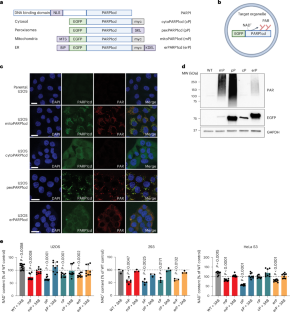Subcellular NAD+ pools are interconnected and buffered by mitochondrial NAD+
IF 18.9
1区 医学
Q1 ENDOCRINOLOGY & METABOLISM
引用次数: 0
Abstract
The coenzyme NAD+ is consumed by signalling enzymes, including poly-ADP-ribosyltransferases (PARPs) and sirtuins. Ageing is associated with a decrease in cellular NAD+ levels, but how cells cope with persistently decreased NAD+ concentrations is unclear. Here, we show that subcellular NAD+ pools are interconnected, with mitochondria acting as a rheostat to maintain NAD+ levels upon excessive consumption. To evoke chronic, compartment-specific overconsumption of NAD+, we engineered cell lines stably expressing PARP activity in mitochondria, the cytosol, endoplasmic reticulum or peroxisomes, resulting in a decline of cellular NAD+ concentrations by up to 50%. Isotope-tracer flux measurements and mathematical modelling show that the lowered NAD+ concentration kinetically restricts NAD+ consumption to maintain a balance with the NAD+ biosynthesis rate, which remains unchanged. Chronic NAD+ deficiency is well tolerated unless mitochondria are directly targeted. Mitochondria maintain NAD+ by import through SLC25A51 and reversibly cleave NAD+ to nicotinamide mononucleotide and ATP when NMNAT3 is present. Thus, these organelles can maintain an additional, virtual NAD+ pool. Our results are consistent with a well-tolerated ageing-related NAD+ decline as long as the vulnerable mitochondrial pool is not directly affected. By increasing NAD+ consumption in various organelles, mitochondria are revealed to act as buffers that help maintain subcellular NAD+ levels. At the same time, cells are found to be particularly sensitive to a decline in NAD+ levels originating from mitochondria themselves.


亚细胞 NAD+ 池相互连接,并由线粒体 NAD+ 缓冲
辅酶 NAD+ 被信号酶消耗,其中包括多-ADP-核糖转移酶(PARPs)和 sirtuins。衰老与细胞 NAD+ 水平下降有关,但细胞如何应对持续下降的 NAD+ 浓度尚不清楚。在这里,我们发现亚细胞的 NAD+ 池是相互关联的,线粒体在过度消耗 NAD+ 的情况下充当了维持 NAD+ 水平的调节器。为了诱发NAD+的慢性特异性过度消耗,我们设计了在线粒体、细胞质、内质网或过氧物酶体中稳定表达PARP活性的细胞系,导致细胞NAD+浓度下降达50%。同位素示踪剂通量测量和数学建模表明,NAD+浓度的降低在动力学上限制了 NAD+ 的消耗,以保持与 NAD+ 生物合成率的平衡,而后者保持不变。除非直接针对线粒体,否则慢性 NAD+ 缺乏可被很好地耐受。线粒体通过 SLC25A51 导入维持 NAD+,并在 NMNAT3 存在时将 NAD+ 可逆地裂解为烟酰胺单核苷酸和 ATP。因此,这些细胞器可以维持一个额外的、虚拟的 NAD+ 池。我们的研究结果表明,只要脆弱的线粒体池不直接受到影响,就能很好地耐受与衰老相关的 NAD+ 减少。
本文章由计算机程序翻译,如有差异,请以英文原文为准。
求助全文
约1分钟内获得全文
求助全文
来源期刊

Nature metabolism
ENDOCRINOLOGY & METABOLISM-
CiteScore
27.50
自引率
2.40%
发文量
170
期刊介绍:
Nature Metabolism is a peer-reviewed scientific journal that covers a broad range of topics in metabolism research. It aims to advance the understanding of metabolic and homeostatic processes at a cellular and physiological level. The journal publishes research from various fields, including fundamental cell biology, basic biomedical and translational research, and integrative physiology. It focuses on how cellular metabolism affects cellular function, the physiology and homeostasis of organs and tissues, and the regulation of organismal energy homeostasis. It also investigates the molecular pathophysiology of metabolic diseases such as diabetes and obesity, as well as their treatment. Nature Metabolism follows the standards of other Nature-branded journals, with a dedicated team of professional editors, rigorous peer-review process, high standards of copy-editing and production, swift publication, and editorial independence. The journal has a high impact factor, has a certain influence in the international area, and is deeply concerned and cited by the majority of scholars.
 求助内容:
求助内容: 应助结果提醒方式:
应助结果提醒方式:


